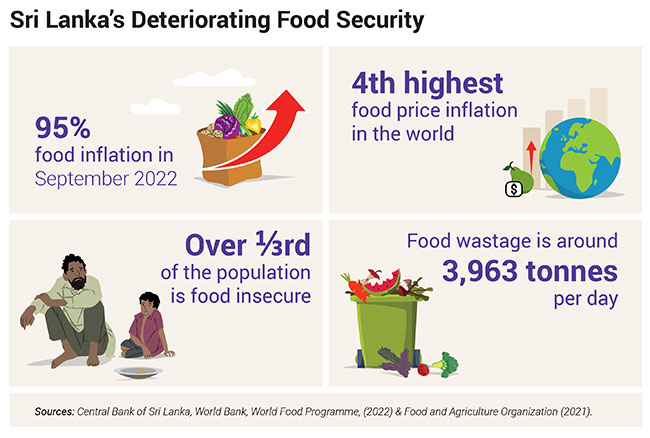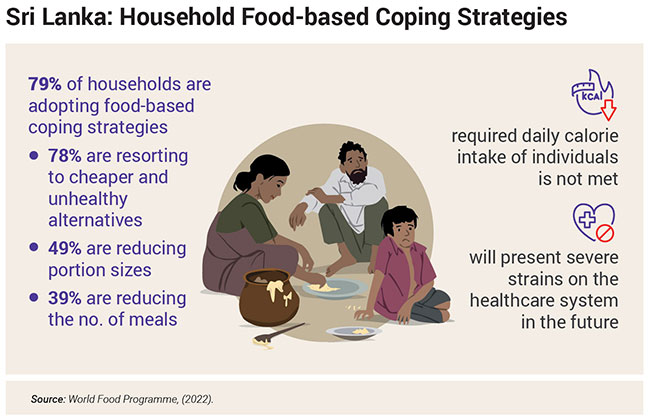Business
Food Fight: Sri Lanka’s Battle for Food Security

By Lakshila Wanigasinghe
 World Food Day is observed on 16 October to promote awareness and action to ensure regular access to nutritious food for all. The blog examines Sri Lanka’s struggle to safeguard food and nutrition security amidst the ongoing economic crisis and outlines policy steps to tackle the challenge.
World Food Day is observed on 16 October to promote awareness and action to ensure regular access to nutritious food for all. The blog examines Sri Lanka’s struggle to safeguard food and nutrition security amidst the ongoing economic crisis and outlines policy steps to tackle the challenge.
Sri Lanka’s economic crisis continues to affect the lives and livelihoods of its people, with the burden being highest on the poor and vulnerable. The situation has progressed from bad to worse, with debt problems spiralling down to impact every aspect of the economy adversely.
Sri Lanka’s Food Crisis
Global disruptions including COVID-19, the climate crisis and Russia’s invasion of Ukraine earlier this year, have impacted food supplies worldwide. However, Sri Lanka’s food insecurity is largely a result of the prevailing economic crisis coupled with short-sighted policies enforced by local policymakers. The overnight ban on chemical fertiliser imports has been costly and generated a lower harvest. Although the ban has since been reversed, it continues to have ripple effects on the food system.
The drastic drop in domestic yield has driven policymakers to spend more money importing necessary commodities previously produced locally, including staples like rice. This move has been detrimental at a time when foreign reserves are lacking. Additionally, import controls imposed by the government have led to certain food items becoming scarce. These supply shortages have led to increases in the prices of essential foods. With food inflation reaching 95% in September, Sri Lanka ranks among the top five countries with the highest food price inflation.
As food becomes scarce and prices continue to rise, more people – the poor in particular – cannot afford proper meals. Adding to the problem are inflationary pressures, the inability of wages to keep up with inflation and income losses induced by the economic crisis. Thus, households are left in a predicament to reduce expenses, including cutting down on consumption expenditure. A World Food Programme (WFP) survey reveals that 79% of households are adopting food-based coping strategies to deal with the crisis.
This affects both the quality and quantity of food consumed. Families are likely to resort to cheaper and unhealthy alternatives (78% of families) due to the inability to afford high-quality, nutritious food. They are also likely to reduce portion sizes (49%) or skip meals entirely (39%), resulting in individuals not meeting their required daily calorie intake. For children, eating less directly impacts growth and contributes to increasing the already high rates of child malnutrition in the country. For adults – considering the rapidly ageing population in Sri Lanka – undernourishment implies severe strains on the healthcare system in the future.
Government Action to Combat
Food Insecurity
 The interim Budget proposed to allocate LKR 46,600 million for crisis-related initiatives, including providing LKR 10,000 per food-insecure family and an additional monthly allowance of LKR 2,500 for pregnant mothers for four months respectively. A further LKR 400 million was allocated for the Department of Agriculture to provide farmers with seeds/planting material urgently and LKR 40 billion for fertiliser for paddy cultivation for the 2022/2023 ‘Maha’ season. Additionally, the government recently initiated a National Food Security Programme. The interim Budget also proposed establishing youth agriculture companies, writing off paddy farmers’ outstanding loans, etc. While the success of these initiatives is yet to be realised, it will depend entirely on the effectiveness of implementation. However, the pressure for timely success is high and critical for combating food insecurity.
The interim Budget proposed to allocate LKR 46,600 million for crisis-related initiatives, including providing LKR 10,000 per food-insecure family and an additional monthly allowance of LKR 2,500 for pregnant mothers for four months respectively. A further LKR 400 million was allocated for the Department of Agriculture to provide farmers with seeds/planting material urgently and LKR 40 billion for fertiliser for paddy cultivation for the 2022/2023 ‘Maha’ season. Additionally, the government recently initiated a National Food Security Programme. The interim Budget also proposed establishing youth agriculture companies, writing off paddy farmers’ outstanding loans, etc. While the success of these initiatives is yet to be realised, it will depend entirely on the effectiveness of implementation. However, the pressure for timely success is high and critical for combating food insecurity.
Overcoming Hunger and Achieving
Food Security
While long-term strategies are needed to counter the underlying causes of food insecurity and ensure sustainable domestic production, swift action must be taken to tackle the challenge of ensuring people do not go hungry at present. Supporting immediate food needs amid the prevailing economic crisis requires a twofold effort: protecting the (1) poor and (2) farming community. In this regard, targeted measures to support the poor and near-poor through policy interventions and strengthened social safety nets are vital. The government has already allocated funds in this regard; however, successful implementation depends on accurately identifying groups at risk of starvation and providing them with immediate food assistance through subsidised products or cash transfers.
Attention should also be directed towards middle-income earners, who often get left behind in aid processes but may be in dire need of support given Sri Lanka’s current economic standing. Measures should also be taken to guarantee food availability across all parts of the country, thus ensuring equitable access. Protecting farmers’ livelihoods require adequate fertiliser availability at reasonable prices. More efficient use of fertiliser and high-quality seeds also play a role in ensuring limited supplies last longer. This will secure a harvest that can better support domestic demand next season. The government can also repurpose idle land for crop production and encourage small-scale farming.
Given the debt crisis, although import restrictions on certain foods are needed, they tend to be counterproductive. As evident from the global food crisis in 2008, trade restrictions drove up food prices rather than subsidising them. Moreover, stricter regulations should be in place to ensure consumers are not overcharged for high-demand items, as was evident for milk powder and fuel earlier this year. Minimising the high levels of food wastage (approximately 3,963 tonnes per day) also plays a crucial role in satisfying immediate food needs. Not stockpiling food, purchasing homegrown products, and consuming leftovers at a later stage/restaurants donating leftovers to the poor are ways households and businesses can contribute to combating food insecurity.
A food crisis during an economic crisis is a catastrophic scenario. Given that over one-third of the population is presently food insecure, it is imperative that Sri Lanka promptly takes corrective action. While several measures have been introduced in this regard, they must be subject to timely revaluations to gauge effectiveness. Given the prevailing resource constraints, it is natural for government support to target the poor and vulnerable solely. However, working towards acquiring international assistance to support immediate food needs, especially targeting those just above the poverty line and groups traditionally excluded from aid programmes, may also be required. These actions must be coupled with medium- to long-term initiatives that ensure sustainable food production in the future. Moreover, policymakers must be willing to be flexible and change their course of action if needed, given the volatility of the current situation. The consequences of not doing so will leave lasting impacts on the lives and livelihoods of the people.
Link to original blog:
Lakshila Wanigasinghe is a Research Officer at the IPS with research interests in poverty, social welfare, development, education, and health. She holds an MSc in Economics with a concentration in Development Economics and a BA in Economics with concentrations in International, Financial and Law and Economics from Southern Illinois University Carbondale (SIUC), US. (lakshila@ips.lk)
Business
AHK Sri Lanka champions first-ever Sri Lankan delegation at Drupa 2024

The Delegation of German Industry and Commerce in Sri Lanka (AHK Sri Lanka) proudly facilitated the first-ever Sri Lankan delegation’s participation at Drupa 2024, the world’s largest trade fair for the printing industry and technology. Held after an eight-year hiatus, Drupa 2024 was a landmark event, marking significant advancements and opportunities in the global printing industry.
AHK Sri Lanka played a pivotal role in organising and supporting the delegation, which comprised 17 members from the Sri Lanka Association for Printers (SLAP), representing eight companies from the commercial, newspaper, stationery printing, and packaging industries. This pioneering effort by AHK Sri Lanka not only showcased the diverse capabilities of Sri Lanka’s printing sector but also facilitated vital bilateral discussions with key stakeholders from the German printing industry.
Business
Unveiling Ayugiri: Browns Hotels & Resorts sets the stage for a new era in luxury Ayurveda Wellness

In a captivating reimagining of luxury wellness tourism, Browns Hotels & Resorts proudly unveiled the exquisite Ayugiri Ayurveda Wellness Resort Sigiriya. This momentous occasion, celebrated amidst a vibrant and serene grand opening on the 6th of June, heralds a new chapter in the Ayurveda wellness tourism landscape in Sri Lanka. Nestled amidst 54 acres of unspoiled natural splendour, Ayugiri features 22 exclusive suites and stands out as the only luxury Ayurveda wellness resort in the country offering plunge pools in every room, rendering it truly one-of-a-kind.
The grand opening of Ayugiri Ayurveda Wellness Resort was an enchanting event, where guests were captivated by the melodies of flutists and violinists resonating through Sigiriya’s lush landscapes. As traditional drummers and dancers infused the air with vibrant energy, Browns Hotels & Resorts’ CEO, Eksath Wijeratne, Kotaro Katsuki, Acting Ambassador for the Embassy of Japan and General Manager, Buwaneka Bandara, unveiled the resort’s new logo, marking a significant moment witnessed by distinguished guests from the French Embassy, Ayurveda and wellness enthusiasts along with officials from the Sigiriya area, LOLC Holdings and Browns Group.
“Our strategic expansion into wellness tourism with Ayugiri Ayurveda Wellness Resort Sigiriya symbolises a significant milestone for Browns Hotels & Resorts. Wellness tourism has consistently outperformed the overall tourism industry for over a decade, reflecting a growing global interest in travel that goes beyond leisure to offer rejuvenation and holistic well-being. By integrating the timeless wisdom of Ayurveda with modern luxury, we aim to set a new standard in luxury wellness tourism in Sri Lanka. Whether your goal is prevention, healing, or a deeper connection to inner harmony, Ayugiri offers a sanctuary for holistic well-being” stated Eksath Wijeratne.
Ayugiri encapsulates the essence of life, inspired by the lotus flower held by the graceful queens of the infamous Sigiriya frescoes. Just as the lotus emerges from the murky depths, untainted and serene,
Ayugiri invites guests on a journey of purity and rejuvenation, harmonised with a balance of mind, body and spirit, the essence of nature, echoes of culture and the wisdom of ancient Ayurvedic healing.
Business
HNB General Insurance recognized as Best General Bancassurance Provider in Sri Lanka 2024

HNB General Insurance, one of Sri Lanka’s leading general insurance providers, has been honored as the Best General Bancassurance Provider in Sri Lanka 2024 by the prestigious Global Banking and Finance Review – UK.
The esteemed accolade underscores HNB General Insurance’s unwavering commitment to excellence and its outstanding performance in the field of bancassurance. Through dedication and hard work, the HNB General Insurance team has continuously endeavored to deliver innovative insurance solutions, cultivate strong relationships with banking partners, and provide unparalleled service to customers nationwide. This recognition is a testament to the team’s dedication and relentless pursuit of excellence in the bancassurance business.
“We are honored to receive this prestigious award, which reflects our team’s tireless efforts and dedication to delivering value-added insurance solutions and exceptional service through our bancassurance partnerships,” said Sithumina Jayasundara, CEO of HNB General Insurance. “This recognition reaffirms our position as a trusted insurance provider in Sri Lanka and motivates us to continue striving for excellence in serving our customers and communities.”












